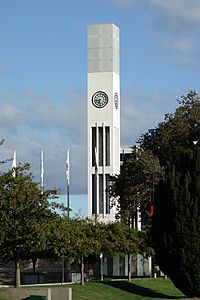Hopwood Clock Tower facts for kids
Quick facts for kids Hopwood Clock Tower |
|
|---|---|
|
Kerei Te Panau
|
|

The Clock Tower mid Summer
|
|
| Alternative names | The Clock Tower, Hopwood's Tower |
| General information | |
| Type | Clock Tower |
| Location | Palmerston North, New Zealand |
| Coordinates | 40°21′23″S 175°36′40.82″E / 40.35639°S 175.6113389°E |
| Construction started | c.1953 |
| Estimated completion | 1957 |
| Cost | Approx. £10,000 |
| Technical details | |
| Floor count | 6 |
The Hopwood Clock Tower, also known as Kerei Te Panau, is a famous clock tower in Palmerston North, New Zealand. You can find it right in the middle of The Square. It's often just called The Clock Tower.
This tower was named after Arthur Hopwood, a local businessman. He paid for it to be built in 1953. The tower's Māori name, 'Kerei Te Panau', honors a local Rangitāne chief. Today, the tower glows at night with a special 'lantern cross' at the top and lit-up glass panels at its base.
Building the Tower
The clock inside the tower has a long history. It was originally in the city's post office. But after an earthquake in 1942, the clock was taken out for safety. It was then put into storage.
In 1953, Arthur Hopwood decided to help. His family owned a hardware store in town. He gave £10,000 (a lot of money back then!) to the city council. This money was used to build a new tower just for the clock. The tower was finished around 1957. To make space for it, an old band rotunda (a small, round building for musicians) was taken down.
Changes Over Time
The Hopwood Clock Tower has been updated many times since it was first built. In the early 1960s, a stone cross was added to the very top. Around 1990, a sound shell at the tower's base was removed.
In the mid-2000s, The Square was being updated. The tower was checked to make sure it met modern building rules. Engineers found it needed to be much stronger. So, the tower was carefully taken apart and rebuilt. The new structure looked just like the old one but was much stronger. During this rebuild, the glowing 'lantern section' was added. This lantern has a cross inside, which caused some discussion in the community. The whole project was finished in March 2007 and cost $1.7 million.
 | Claudette Colvin |
 | Myrlie Evers-Williams |
 | Alberta Odell Jones |

